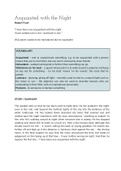Acquainted with the Night
Robert Frost
“I have been one acquainted with the night.
I have walked out in rain—and back in rain.”
(Full poem unable to be reproduced due to copyright)
VOCABULARY
Acquainted - met or experienced something, e.g. to be acquainted with a person
means that you’ve met them, but you aren’t necessarily close friends
Outwalked - walked out beyond or further than something can go
Watchman on his beat - a guard whose job it is to walk around a property and keep
an eye out for something - ‘on his beat’ means ‘on his rounds’, the route that he
patrols
Luminary - glowing, giving off light - normally used to refer to a natural light such as
the moon or sun - the adjective can also be used to describe humans who are
outstanding in their field, with an inspirational personality
Proclaim - to announce or declare something
STORY / SUMMARY
The speaker tells us that he has been used to night-time. He has walked in the night,
even in the rain, and beyond the furthest lights of the city into the darkness of the
wider landscape. He has looked down deserted city lanes that seemed sad, and
walked past the night watchman with his eyes downturned, ‘unwilling to explain’ to
him why he’s walking around at night when everyone else is asleep. He has stopped
walking and stood still to listen to a loud ‘cry’ from a few houses back, although this
should wasn’t for him - it wasn’t calling him back or saying goodbye. He notices too,
further off and high up in the distance, a ‘luminary clock against the sky’ - the shining
moon. In the final couplet, he says that the moon announced the time, but made no
judgement on him being up at that hour - it was ‘neither wrong nor right’. And then, he
repeats the first line - ‘I have been one acquainted with the night’.
, SPEAKER / VOICE
The speaker has a slightly sad, wistful tone as he discusses his forays into the night,
where he walks alone to the edge of civilisation, past ‘the furthest city light’,
‘unwilling to explain’ himself to others such as the watchman, who wonder why he
feels the need to walk around at night alone. He seems to also find comfort in the
night, though other people may judge him the moon acts impartially, simply
reminding him of the time as it travels across the sky without making him feel more
relaxed and able to walk for as long as he pleases without guilt.
LANGUAGE
Sibilance - ‘I have looked down the saddest city lane’ - the sibilance and fricative
sounds in this line create a melancholy mood, as if the landscape around the speaker
is reflecting his inner state of mind. Alternatively, we could interpret that the speaker
uses a kind of personification, with the superlative adjective ‘saddest’ referring to
the lane, to show that he feels sad for the deserted streets, which in a ‘city’ are used to
being busy, as so he is tempted to walk down it to make it feel better.
Extended metaphor - If we interpret darkness symbolically, the poem becomes an
extended metaphor for the idea of facing adversity, difficulty or the unknown alone. In
this case, the speaker is saying that he has been ‘acquainted’ with dark and difficult
experiences, and continues to encounter them, and that he doesn’t shy away from or
fear these experiences. We could see his forays into the night as a mode of
self-exploration and self-development, a peaceful time to reflect on himself and his
day.
First person singular pronouns - The speaker uses the first person singular pronoun ‘I’
to emphasise the singular and individual nature of the activity. He is entirely alone,
actively not connecting to the other humans in the poem, such as the ‘watchman’ on
his duty, with whom he refuses to make eye contact, or the ‘cry’ which he realises is not
directed towards him.
Visual imagery - ‘one luminary clock against the sky’ - the moon, transfigured here
into a ‘clock’ as the speaker uses its position in the sky to tell the time, is described
using the adjective ‘luminary’. This creates a hopeful tone, as if the moon is a





